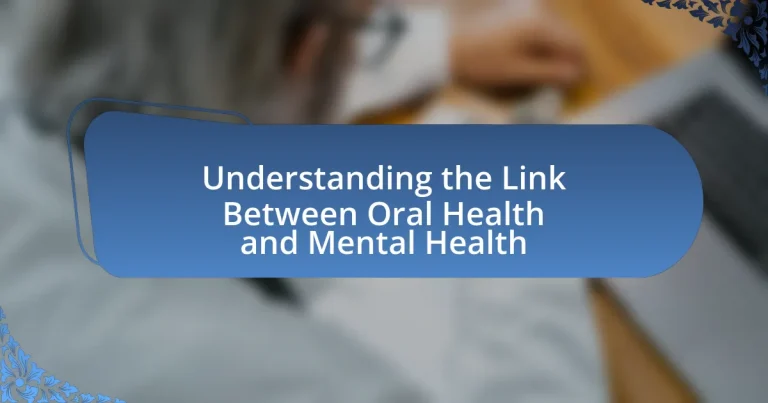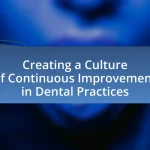The article examines the significant link between oral health and mental health, highlighting how poor oral health can lead to increased anxiety, depression, and social withdrawal. It discusses the bidirectional relationship where mental health conditions can result in neglect of oral hygiene, exacerbating dental issues. Key factors influencing this connection include the psychological effects of oral diseases, the impact of stress and anxiety on oral health, and the importance of integrated healthcare approaches. The article emphasizes the necessity of maintaining good oral hygiene practices and seeking mental health support to improve overall well-being.
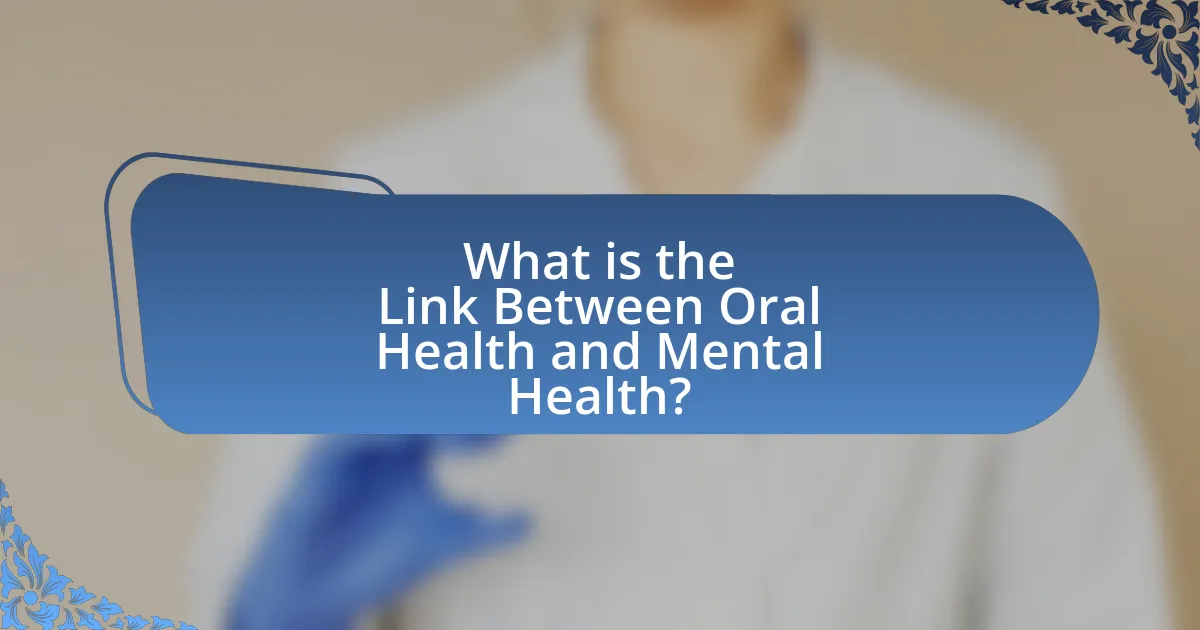
What is the Link Between Oral Health and Mental Health?
The link between oral health and mental health is significant, as poor oral health can negatively impact mental well-being. Research indicates that individuals with dental issues often experience higher levels of anxiety, depression, and social withdrawal. For instance, a study published in the Journal of Dental Research found that individuals with periodontal disease reported lower quality of life and higher levels of psychological distress. Additionally, mental health conditions can lead to neglect of oral hygiene, creating a cyclical relationship where each aspect exacerbates the other.
How do oral health and mental health influence each other?
Oral health and mental health influence each other significantly, as poor oral health can lead to mental health issues, while mental health conditions can exacerbate oral health problems. Research indicates that individuals with dental issues often experience increased levels of anxiety and depression, primarily due to the impact of oral pain, social stigma, and reduced self-esteem associated with poor oral hygiene. Conversely, mental health disorders such as depression and anxiety can lead to neglect of oral care, resulting in higher rates of dental decay and gum disease. A study published in the Journal of Dental Research found that individuals with depression are 1.5 times more likely to have untreated dental caries, highlighting the bidirectional relationship between these two aspects of health.
What are the psychological effects of poor oral health?
Poor oral health can lead to significant psychological effects, including increased anxiety, depression, and low self-esteem. Research indicates that individuals with dental issues often experience social withdrawal and feelings of embarrassment due to the appearance of their teeth, which can exacerbate mental health problems. A study published in the Journal of Dental Research found that individuals with poor oral health reported higher levels of psychological distress, highlighting the direct correlation between oral health and mental well-being. Furthermore, the World Health Organization emphasizes that oral diseases can negatively impact quality of life, contributing to emotional and psychological challenges.
How can mental health issues impact oral hygiene practices?
Mental health issues can significantly impact oral hygiene practices by leading to neglect of personal care routines. Individuals experiencing conditions such as depression or anxiety may lack the motivation or energy to maintain regular oral hygiene, resulting in increased plaque buildup and higher rates of dental decay. Research indicates that people with depression are more likely to have poor oral health, with studies showing that 30% of individuals with depression report inadequate oral hygiene practices. This neglect can create a cycle where poor oral health further exacerbates mental health issues, highlighting the interconnectedness of these two aspects of health.
Why is understanding this link important?
Understanding the link between oral health and mental health is important because poor oral health can significantly impact mental well-being. Research indicates that individuals with dental issues often experience higher levels of anxiety and depression, which can exacerbate their oral health problems. For instance, a study published in the Journal of Dental Research found that individuals with periodontal disease were more likely to report symptoms of depression. This connection underscores the necessity for integrated healthcare approaches that address both oral and mental health to improve overall patient outcomes.
What are the potential consequences of neglecting the connection?
Neglecting the connection between oral health and mental health can lead to significant consequences, including increased risk of mental health disorders and deteriorating physical health. Research indicates that poor oral health can exacerbate conditions such as anxiety and depression, as individuals may experience pain, social stigma, and reduced self-esteem due to dental issues. Additionally, mental health problems can lead to neglect of oral hygiene, creating a vicious cycle that further deteriorates both oral and mental health. For instance, a study published in the Journal of Periodontology found that individuals with depression are more likely to have periodontal disease, highlighting the interdependence of these health aspects.
How can awareness improve overall health outcomes?
Awareness can improve overall health outcomes by enabling individuals to recognize and address health issues proactively. Increased awareness leads to better health literacy, which empowers people to make informed decisions regarding their health behaviors, such as maintaining oral hygiene and seeking mental health support. Research indicates that individuals with higher health awareness are more likely to engage in preventive measures, reducing the incidence of chronic diseases. For example, a study published in the Journal of Public Health found that enhanced awareness of oral health significantly correlates with improved mental health outcomes, demonstrating the interconnectedness of these health domains.
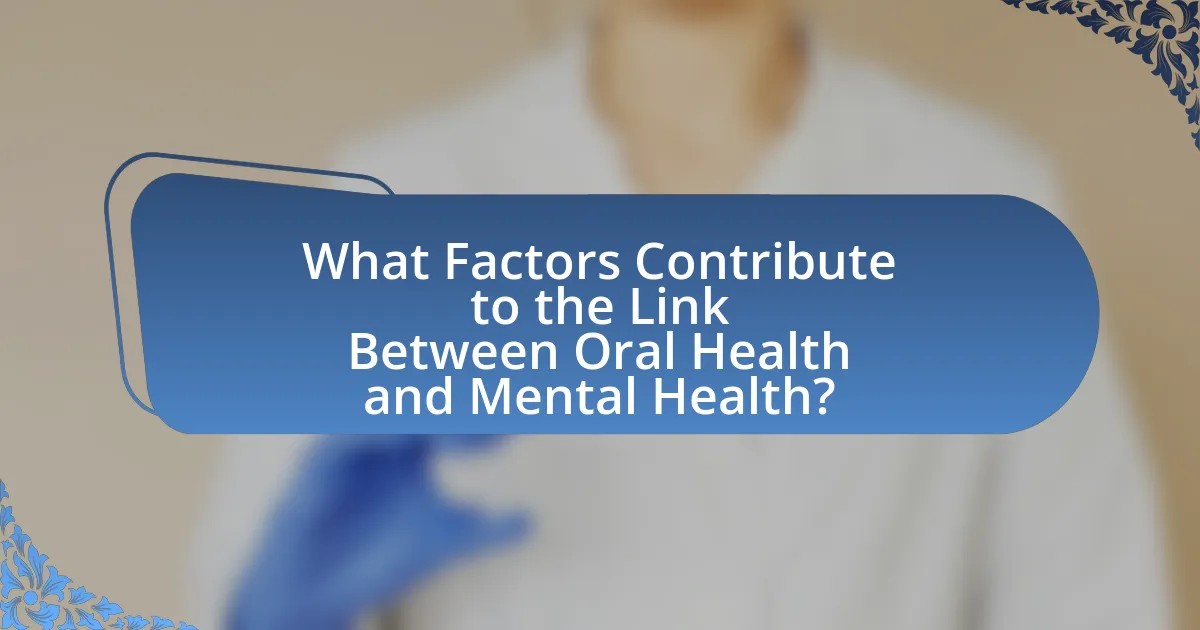
What Factors Contribute to the Link Between Oral Health and Mental Health?
The link between oral health and mental health is influenced by several factors, including the impact of mental health conditions on oral hygiene practices, the psychosocial effects of oral diseases, and the bidirectional relationship between the two. Individuals with mental health disorders, such as depression and anxiety, often neglect oral care, leading to poor oral health outcomes. Conversely, oral health issues can exacerbate mental health problems by causing pain, discomfort, and social stigma. Research indicates that individuals with periodontal disease are more likely to experience depression, highlighting the interconnectedness of these health domains. For instance, a study published in the Journal of Periodontology found that individuals with severe periodontal disease had a higher prevalence of depression compared to those with healthy gums, reinforcing the importance of addressing both oral and mental health in healthcare settings.
How do stress and anxiety affect oral health?
Stress and anxiety negatively impact oral health by contributing to conditions such as gum disease, tooth decay, and bruxism. Elevated stress levels can lead to increased inflammation in the body, which exacerbates periodontal disease, as noted in a study published in the Journal of Periodontology, where researchers found a direct correlation between stress and the severity of gum disease. Additionally, anxiety can result in behaviors like teeth grinding, which can wear down enamel and lead to tooth sensitivity and pain. Furthermore, individuals experiencing high levels of stress may neglect oral hygiene practices, increasing the risk of cavities and other dental issues.
What are common oral health issues associated with stress?
Common oral health issues associated with stress include teeth grinding (bruxism), gum disease, and oral ulcers. Stress can lead to bruxism, where individuals unconsciously grind or clench their teeth, resulting in tooth wear and jaw pain. Additionally, stress can weaken the immune system, making individuals more susceptible to gum disease, which affects the tissues supporting the teeth. Oral ulcers, or canker sores, can also be triggered by stress, causing discomfort and pain in the mouth. Studies indicate that individuals experiencing high levels of stress are more likely to report these oral health problems, highlighting the significant impact of mental health on oral well-being.
How can anxiety lead to neglect of oral care?
Anxiety can lead to neglect of oral care by causing individuals to prioritize their mental distress over daily hygiene routines. When experiencing anxiety, individuals may feel overwhelmed, leading to a lack of motivation or energy to maintain regular oral hygiene practices such as brushing and flossing. Research indicates that anxiety disorders can result in decreased self-care behaviors, including neglecting dental health, as individuals may become preoccupied with their anxious thoughts and feelings, thus sidelining essential tasks like oral care.
What role does depression play in oral health?
Depression significantly impacts oral health by contributing to poor oral hygiene practices and increasing the risk of dental diseases. Individuals with depression often experience a lack of motivation, which can lead to neglecting daily oral care routines such as brushing and flossing. Research indicates that people with depression are more likely to suffer from periodontal disease and tooth decay due to these neglected hygiene practices. A study published in the Journal of Periodontology found that individuals with major depressive disorder had a higher prevalence of periodontal disease compared to those without depression, highlighting the direct correlation between mental health and oral health outcomes.
How does depression affect motivation for dental care?
Depression significantly reduces motivation for dental care. Individuals experiencing depression often exhibit symptoms such as fatigue, lack of interest, and feelings of hopelessness, which can lead to neglecting personal hygiene and health routines, including dental care. Research indicates that people with depression are less likely to seek preventive dental services and more likely to experience oral health issues, as evidenced by a study published in the Journal of Dental Research, which found that individuals with depressive symptoms had a higher prevalence of untreated dental caries and periodontal disease. This correlation underscores the impact of mental health on oral health behaviors and highlights the need for integrated care approaches that address both mental and dental health.
What are the physical manifestations of depression in oral health?
The physical manifestations of depression in oral health include dry mouth, gum disease, and changes in oral hygiene habits. Depression can lead to decreased saliva production, resulting in dry mouth, which increases the risk of cavities and oral infections. Additionally, individuals with depression may neglect oral hygiene, leading to plaque buildup and gum disease. Research indicates that people with depression are more likely to experience periodontal disease, as noted in a study published in the Journal of Periodontology, which found a significant correlation between depression severity and periodontal health.
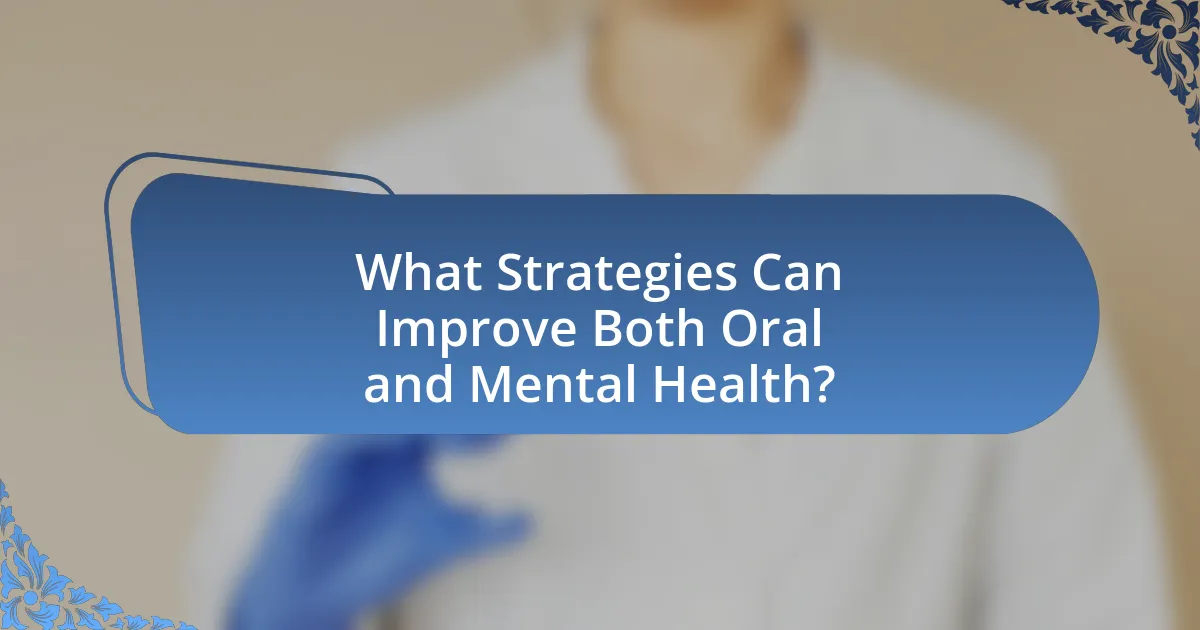
What Strategies Can Improve Both Oral and Mental Health?
Regular dental check-ups and maintaining good oral hygiene can significantly improve both oral and mental health. Research indicates that poor oral health is linked to increased levels of anxiety and depression, while good oral hygiene practices, such as brushing twice daily and flossing, can enhance self-esteem and overall well-being. A study published in the Journal of Dental Research found that individuals with better oral health reported lower levels of psychological distress, highlighting the connection between oral care and mental health. Additionally, engaging in social activities that promote oral health, such as group dental visits or community health programs, can foster social connections and reduce feelings of isolation, further benefiting mental health.
How can individuals maintain good oral hygiene to support mental health?
Individuals can maintain good oral hygiene to support mental health by practicing regular brushing, flossing, and routine dental check-ups. Consistent brushing twice a day with fluoride toothpaste and daily flossing helps prevent dental issues, which can contribute to anxiety and depression. Research indicates that poor oral health is linked to increased levels of stress and lower self-esteem, which can negatively impact mental well-being. Additionally, regular dental visits allow for early detection and treatment of oral health problems, reducing the potential for pain and discomfort that can exacerbate mental health issues.
What daily practices can enhance both oral and mental well-being?
Daily practices that can enhance both oral and mental well-being include maintaining a consistent oral hygiene routine, engaging in regular physical activity, and practicing mindfulness or meditation. Consistent oral hygiene, such as brushing twice a day and flossing daily, not only prevents dental issues but also contributes to overall health, which is linked to improved mental well-being. Research indicates that individuals with good oral health often report lower levels of anxiety and depression, highlighting the connection between oral and mental health. Regular physical activity releases endorphins, which improve mood and reduce stress, while mindfulness practices have been shown to decrease anxiety and enhance emotional regulation, further supporting mental health.
How can mindfulness and stress reduction techniques benefit oral health?
Mindfulness and stress reduction techniques can significantly benefit oral health by reducing anxiety and promoting relaxation, which in turn lowers the risk of stress-related oral issues such as teeth grinding and gum disease. Research indicates that high stress levels can lead to behaviors detrimental to oral health, including neglecting dental hygiene and increased inflammation in the gums. A study published in the Journal of Periodontology found that individuals who practiced mindfulness reported lower levels of stress and improved oral hygiene practices, leading to healthier gums and reduced plaque buildup. Therefore, incorporating mindfulness and stress reduction techniques can enhance overall oral health by mitigating the negative effects of stress on dental care and oral conditions.
What resources are available for individuals struggling with both issues?
Individuals struggling with both oral health and mental health issues can access various resources, including community health programs, mental health services, and dental care initiatives. For example, the National Institute of Mental Health provides information and referrals for mental health services, while organizations like the American Dental Association offer resources for affordable dental care. Additionally, local health departments often have programs that address both oral and mental health, providing integrated care options. These resources are designed to support individuals in managing the interconnected challenges of oral and mental health effectively.
How can healthcare providers address the link between oral and mental health?
Healthcare providers can address the link between oral and mental health by integrating oral health assessments into mental health care and vice versa. This approach recognizes that conditions such as depression and anxiety can lead to poor oral hygiene and dental issues, while oral health problems can exacerbate mental health conditions. Research indicates that individuals with depression are 1.5 times more likely to have periodontal disease, highlighting the bidirectional relationship. By fostering collaboration between dental and mental health professionals, providers can create comprehensive care plans that address both aspects, improving overall patient outcomes.
What community programs support integrated care for oral and mental health?
Community programs that support integrated care for oral and mental health include initiatives like the Collaborative Care Model, which integrates behavioral health services into primary care settings, allowing for comprehensive treatment of both oral and mental health issues. Programs such as the Dental Health Integration Program in various states provide training for dental professionals to recognize mental health conditions and refer patients accordingly. Additionally, community health centers often implement integrated care models that combine dental and mental health services, improving access and outcomes for patients. These programs are supported by evidence showing that addressing both oral and mental health leads to better overall health outcomes, as highlighted in studies published by the American Journal of Public Health.
What are practical tips for managing oral health to support mental well-being?
Practical tips for managing oral health to support mental well-being include maintaining a consistent oral hygiene routine, which involves brushing teeth twice daily and flossing regularly. This routine helps prevent dental issues that can lead to pain and discomfort, negatively impacting mental health. Additionally, regular dental check-ups are essential; studies show that individuals who visit the dentist regularly experience lower levels of anxiety and depression. A balanced diet rich in vitamins and minerals also supports oral health, as deficiencies can lead to oral diseases that may exacerbate mental health issues. Furthermore, reducing sugar intake can prevent cavities and gum disease, which are linked to increased stress and anxiety. Engaging in stress-reducing activities, such as mindfulness or exercise, can also promote better oral health by reducing habits like teeth grinding.
